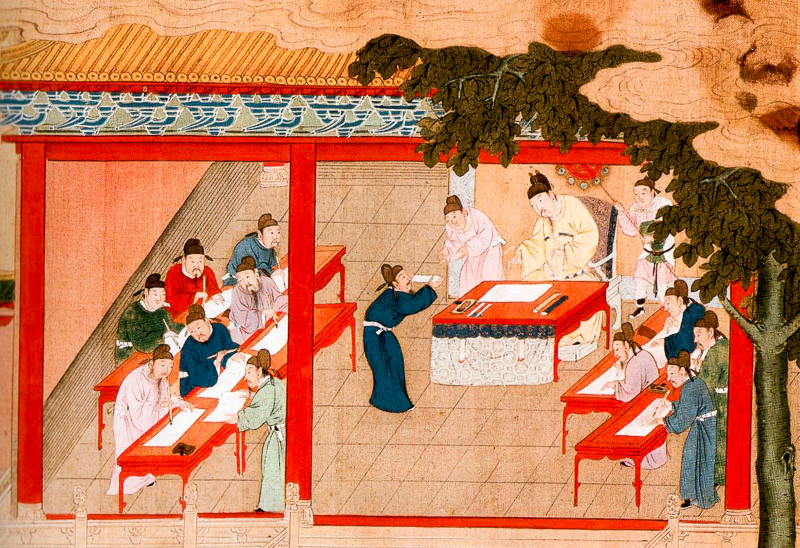Definition of 科举 in the Chinese dictionary
Imperial Examination from the Sui and Tang dynasties to the feudal dynasty sub-subjects selected civil service officials reserve staff system. Many subjects of liberal arts in the Tang Dynasty, held each year. Ming and Qing dynasties liberal arts only a Jinshi a subject, test eight shares, martial examination riding shot, weight lifting and other martial arts, held once every three years. 科举 从隋唐到清代的封建王朝分科考选文武官吏后备人员的制度。唐代文科的科目很多,每年举行。明清两代文科只设进士一科,考八股文,武科考骑射、举重等武艺,每三年举行一次。
Click to
see the original definition of «科举» in the Chinese dictionary.
Click to
see the automatic translation of the definition in English.
10 CHINESE BOOKS RELATING TO «科举»
Discover the use of
科举 in the following bibliographical selection. Books relating to
科举 and brief extracts from same to provide context of its use in Chinese literature.
本书系统地介绍了科举制度的产生、发展和衰亡的过程。以及出题、答卷、阅卷、放榜和状元、榜眼、探花、进士、举人、秀才名称的由来等。并附有答卷所用的各种文体示例.
吴宗国(1934~ ),北京大学历史系教授,中国古代史教研室主任.
本书包括:从察举制到科举制;科举制度演变的外部条件与内在机制;科举制度与封建中央集权政治;科举制度与独尊儒术的封建文化;科举制度的规范化与程式化等内容.
2003年浙江省省级社会科学学术著作出版资金资助出版 2002年浙江省社会科学规划课题 2001年宁波市社会经济发展课题
本书介绍了科举文体的社会内容、类型与组合、特点及其发展规律、与其他文体之间的关系,以及中国历代科举考试的文体变化等.
本书介绍科举史发展的方方面面,用一个个生动有趣的故事情节来介绍科举知识。
本书包括7章内容,详细地介绍了礼学与书塾、书院、武学及其他各类学校、科举考试、学校科举制度与明代社会等内容.
本书内容大体可分科举与社会、南宋前期的政治与军事、经济、吏治与法制、人物与思想、史料与考证、学术争鸣等七类。收录文章有《科举制度与宋代文化》、《北宋扩大科举取士 ...
本书在前人唐诗研究成果的基础上,提出了科举诗的概念,首次对《全唐诗》中所收录的科举诗进行了考辨和梳理 ...
10 NEWS ITEMS WHICH INCLUDE THE TERM «科举»
Find out what the national and international press are talking about and how the term
科举 is used in the context of the following news items.
废除科举110周年宋代科举已遭遇“高考移民”?
1905年9月2日,经袁世凯奏请,慈禧太后以光绪帝的名义发布上谕,正式宣告废除科举制度。这一事件至今已整整110周年。 无论在当时还是今日,废除科举事件都 ... «搜狐, Sep 15»
陕西岚皋现清代科举乡试试卷原刻本距今122年
硃(音zhū)卷是一种科举试卷的名目。明、清两代,为防考官衔私舞弊,乡试及会试场内,应试人的原卷(即墨卷)须弥封糊名,由誊录人用朱笔誊写一遍,再交考官批阅, ... «新浪网, Aug 15»
唐代为何组织一次“零录取率”科举
这一年,举行科举考试,意在网罗天下才子。而赴考的人,也和往年一样,熙熙攘攘,不计其数。而最后的结果,令人大跌眼镜:一个都没考上。 换言之,录取率为零。 «凤凰网, Aug 15»
历史学者蒙曼:高考延续了科举中最美妙的部分
核心提示:科举与高考,一个跨越了一千三百多年,一个正在影响900余万考生的命运。同样作为考试选拔的制度,二者却不尽相同。本期《掷地有声》搜狐教育名家沙龙 ... «搜狐, Jun 15»
科举史上的三大名榜
在科举史上,能金榜题名的无疑都是当时的精英,不过,金榜题名与名传后世并不是同义词,考场上的精英们往往很难成为让后人津津乐道的大名人,甚至很多时候, ... «金羊网, Jun 15»
古往今来高考路:唐代科举不仅看成绩还要有人推荐
提到“高考”,好像是近现代人们的专属。其实,中国古代1300多年的科举考试也是一种“高考”,只不过和学历、官职相挂钩的科举考试更像是现在“高考+公考”的合体。 «中国新闻网, Jun 15»
古代科举的雷人事:明代有考生因大风刮跑卷子落榜
古代的高考,就是科举考试,科举考试从设立时起就被确立为一种制度,有着严格的规范性操作。但我们在阅读相关史书时,却发现科举考试过程中也发生了一些雷人的 ... «中国新闻网, Jun 15»
古代科举也有"特招":唐代设"制科"选拔特长生
唐代士子们科举考试后,及第者要通过吏部的考试才能被授予官职,而制科是皇帝亲自主持的考试,通过者可以直接授予相应官职,这说明他们确实有某项特长而适合 ... «中国新闻网, Jun 15»
明朝之前的科举不可能出现“连中三元”的情况
科举始于隋朝,经唐宋的发展,到明朝已趋于成熟。从形式到内容,明朝进一步完善了科举制度。层层选拔、层层筛选,每场都是淘汰赛,只有最优异者才能出线。我们所 ... «中国新闻网, May 15»
蒲松龄笔下的关羽:穿越到清朝担任科举考官
故事名为《考城隍》,这个具有浓厚神话色彩的故事,表面上讲的是幽冥世界,实际上是清朝科举考试的一种神话式阐述。 蒲松龄说得有板有眼,故事主角是他姐夫的 ... «人民网, May 15»


